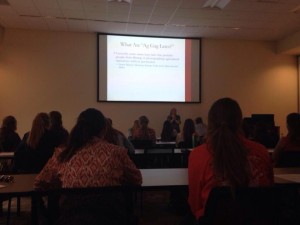Yesterday, I had the great opportunity to speak at the American Quarter Horse Association’s Youth Excellence Seminar here in College Station. It does not seem like that long ago I was going to these type of conferences as a 4-H and FFA member! I hate to pick favorites, but I’ll admit that was the most fun presentation that I’ve given. The kids asked great questions, had thoughtful debates, and were extremely interested in the ag law issues raised. Looking at the 40 young people in that room, I’d say our future is in good hands. Thanks to Robin Alden for the opportunity to speak and welcome to the new followers from that presentation.
It has been another busy week in the ag law realm. Here are a few of the big stories in the news.
* Texas Supreme Court Issues Royalty Calculation Decision. Last week, the Texas Supreme Court issued an opinion in French v. Occidental Permian Ltd., a case of first impression involving the use of CO2 in the oil production process. The primary issue in the case is whether royalty interest owners should be required to share in the costs to remove CO2 from produced oil when the CO2 was injected into the well during the production process to assist with oil recovery. The Texas Supreme Court sided with Occidental, holding that under the leases at issue, “French, having given Oxy the right and discretion to decide whether to reinject or process the casinghead gas, and having benefitted from that decision, must share in the cost of CO2 removal.” This case outlines the distinction under Texas law between production costs (which are born solely by the working interest owner and are not charged to the royalty owner) and post-production costs (which are shared by the working interest owner and royalty owner). [Read opinion here.]
* Dow Chemical’s Water Woes Signal Trouble. This Texas Tribune article discusses water related issues in Texas facing manufacturer Dow Chemical and explains how these problems are evidence of larger problems. Included in the article is a discussion of the lawsuit, Texas Farm Bureau v. TCEQ, related to a priority call made by Dow Chemical on the Brazos River. That priority call resulted in hundreds of farmers losing their ability to irrigate crops with Brazos River water. As a senior water rights holder, Dow requested that junior rights on the river be curtailed. The TCEQ granted this request, curtailing uses for all users junior to Dow, but making exceptions for municipalities and power generating plants. A group of farmers and the Texas Farm Bureau filed suit claiming that these exceptions were illegal. A trial court sided with the farmers, but the case is currently on appeal at the Corpus Christi Court of Appeals. [Read article here.]
* Desalination Plant Unveiled in Texas. A new desalination plant in far West Texas intends to produce drinking water. The Loving County facility will treat brackish water and will be used as a test facility for a new type of technology. Officials believe that the plant could also be used to treat water from fracking operations, allowing water to be reused in the oil field. [Read article here.]
* California Water Market Reaching Unseen High Prices. The drought in California has caused the water market to soar. Prices are reaching $2,200 per acre foot in some parts of the state. [Read article here.]
* Three Steps to Creating a Successful Estate Plan. This Forbes article provides three steps to creating a successful estate plan with regard to passing down a home, but the same advice is useful for those of us in the farming and ranching industry looking to pass down operations to the next generation. The author encourages people to do the following. First, keep communication open, both between family members as well as with financial advisors and attorneys. Second, assess the tax situation to determine if issues may call for a more complex estate plan to avoid federal estate taxes. Finally, plan a maintenance fund to assist future generations be able to afford and keep the property.
* Five Essential Financial Steps for Young Workers. Given that I spend my week speaking to young adults, I thought this article was timely as it provides six essential financial steps for young workers to take during their first five years on the job. The recommended steps are: (1) Set a budget; (2) Save for emergencies; (3) Take stock of debt; (4) Think about retirement; (5) Manage risk; and (6) Manage taxes. [Read article here.]












